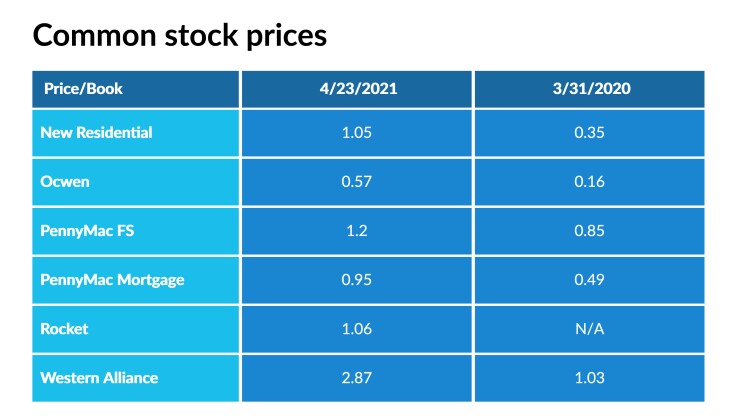The Northeast is enjoying an old-fashioned spring: cold and in some cases freezing even as May fast approaches. But the temperature in the housing sector
The median price for existing home sales rose to
Home prices are not the only part of the housing industrial complex that are on fire in terms of price inflation. The mortgage industry is in the midst of a post-boom consolidation, with several
The purchase of Apollo portfolio company
“AmeriHome’s successful results and unique business model proved to be highly attractive for Western Alliance Bank, which has a history of growing by adding specialized financing groups that excel through differentiated B2B expertise and strong client service,” said AmeriHome CEO Jim Furash.
Next, we saw
New Residential
Led by former Citibank executive Sanjiv Das, Caliber is first and foremost known as a high touch lender focused on purchase mortgages. Like the Amerihome transaction, the deal was priced near book value. The table below shows the multiple of book value for the common stock of some of the mortgage firms mentioned in this article.

“We are excited to be joining the New Residential family,” said Das. “Our combination of strategies will allow us to accelerate our leading position in purchase lending, grow our digital direct to consumer and broker initiatives, and further propel our retail franchise.”
Combined, the two lenders Shellpoint (now NewRez) and Caliber will be a significant lender and also a large, taxable appendage of the REIT. New Residential CEO Michael Nierenberg, a former Bear Stearns banker like this writer, has gradually accumulated significant internal operating capabilities within New Residential. REITs are meant to be investors in non-operating assets in order to maintain passthrough status with the IRS, thus there may be another shoe to drop in this story.
The acquisition of Caliber begs the question as to when a spin-off of the entire New Residential lender/servicer will occur. In the case of Penny Mac, for example, the REIT, PennyMac Mortgage Investment Trust and the seller/servicer, PennyMac Financial Services, are legally separate entities. Both mortgage groups are bound together, however, by strong contractual and business ties, making the PennyMac binary, like New Residential and Fortress, arguably one entity in terms of risk and credit.
Another significant transaction came last week when Ocwen Financial announced the
Ocwen previously had
In yet another deal, TIAA Bank announced the sale of its retail sales, operations and affinity channels in 1-4s to PNC Financial. The former Everbank was once a significant player in mortgage servicing and lending, but with this announcement the bank subsidiary of insurance giant TIAA CREF seems to be withdrawing from the residential mortgage sector. The transaction is expected to close by the third quarter of 2021.
And just yesterday, New York Community Bank announced
While the list of transactions above may seem lengthy, it is fair to say that there will be more deals announced as the year progresses. Several of the firms acquired were
With interest rates up more than 50bp from the February lows and mortgage lending volumes slowing, this may still be a good time for IMBs to seek buyers. The growth in the book equity of the industry during 2020 and the still-strong demand from investors for all manner of mortgage assets means that it is still possible to gain attractive valuations in an industry where trading at a discount to book value was once seen as normal.
Just as existing homes are increasingly scarce, causing bidding wars of extraordinary intensity and forcing prices ever higher, financial assets are also scarce as are operating assets that can generate returns. For a lot of IMBs facing shrinking backlogs and falling secondary market spreads, the attraction of hitting a bid and taking the easy way out via an acquisition may become irresistible.




